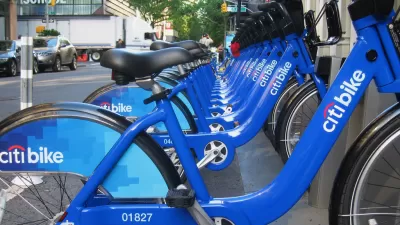It turns out New York isn't the only large city struggling to get its heralded bike-share system off the ground. Chicago's rush to launch Divvy has hit a snag, delaying the program's launch by two weeks.
After a year delay, Chicago's Divvy bike-share system was supposed to launch with a 'big bang' this month. Now comes word that the big bang is more of a big dud. "Divvy was supposed to open for business Friday, capping off Bike to Work Week," reports Tim Akimoff. "But a statement posted on the program’s Tumblr site on Tuesday afternoon said the launch was being pushed back 'to ensure we have the necessary time to test stations and ensure the system is fully functioning.'” Apparently a late arriving part is at least partly to blame for the delay in constructing the system's docking stations.
It's unclear if the delay for testing is related to the technical problems plaguing New York's bike-share program; both systems share the same operator, supplier, and buggy software system. Although Citi Bike has proven incredibly popular since launching at the end of May (annual memberships exceed 36,000), the WNYC Data News Team estimates that at any one time a tenth of the system's docking stations are malfunctioning.
"In fact, it turns out the nation's largest bike share is beta testing the entire software system," write Andrea Bernstein, Steven Melendez and Kate Hinds. "Other than in Chattanooga, Tennessee (31 stations, 300 bikes), the software system used in New York has never been used anywhere. Even in Chattanooga, where the system launch was also delayed, the system isn't perfect, ten months after that city's launch."
"New York's bikes look just like the ones in Boston, Minneapolis, Washington, DC, and London. Those cities -- which used the same software developed for Montreal, North America's first large-scale bike share -- did not experience the kind of software issues New York is having," they add. "But New York's bike share underwent a brain transplant before it came to the Big Apple."
FULL STORY: Chicago Bike Share Also Hitting Snags

Planetizen Federal Action Tracker
A weekly monitor of how Trump’s orders and actions are impacting planners and planning in America.

Congressman Proposes Bill to Rename DC Metro “Trump Train”
The Make Autorail Great Again Act would withhold federal funding to the system until the Washington Metropolitan Area Transit Authority (WMATA), rebrands as the Washington Metropolitan Authority for Greater Access (WMAGA).

The Simple Legislative Tool Transforming Vacant Downtowns
In California, Michigan and Georgia, an easy win is bringing dollars — and delight — back to city centers.

The States Losing Rural Delivery Rooms at an Alarming Pace
In some states, as few as 9% of rural hospitals still deliver babies. As a result, rising pre-term births, no adequate pre-term care and "harrowing" close calls are a growing reality.

The Small South Asian Republic Going all in on EVs
Thanks to one simple policy change less than five years ago, 65% of new cars in this Himalayan country are now electric.

DC Backpedals on Bike Lane Protection, Swaps Barriers for Paint
Citing aesthetic concerns, the city is removing the concrete barriers and flexposts that once separated Arizona Avenue cyclists from motor vehicles.
Urban Design for Planners 1: Software Tools
This six-course series explores essential urban design concepts using open source software and equips planners with the tools they need to participate fully in the urban design process.
Planning for Universal Design
Learn the tools for implementing Universal Design in planning regulations.
Smith Gee Studio
City of Charlotte
City of Camden Redevelopment Agency
City of Astoria
Transportation Research & Education Center (TREC) at Portland State University
US High Speed Rail Association
City of Camden Redevelopment Agency
Municipality of Princeton (NJ)



























